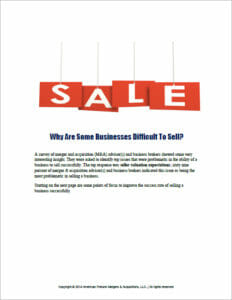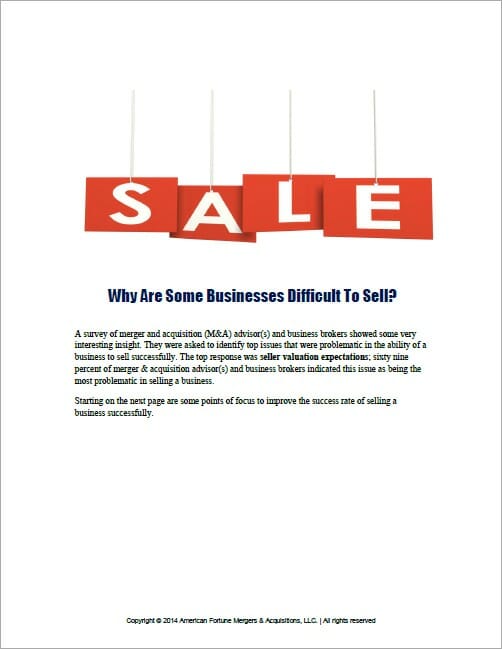Selling Businesses Successfully
In Selling Businesses, statistics show that approximately eight six percent of businesses sell when they are marketed for sale. This means that twenty four percent of businesses never sell. A survey of merger and acquisition (M&A) advisers and business brokers showed some very interesting insight. The merger and acquisition advisers and business brokers were asked to identify top issues that were problematic in the ability of selling businesses successfully. The top response was seller valuation expectations; sixty nine percent of merger & acquisition consultants and business brokers indicated this issue as being the most problematic in a sale of a business.
When Selling Businesses – 10 key reasons why many businesses never sell.
1. The valuation of the business is too high, in some cases by as much as 100%.
2. The business has several family members in top management positions.
3. The owner is the business. The business cannot effectively run without the efforts and know-how of the owner.
4. One or two customers constitute more than 25% of the total business.
5. The business’s industry is diminishing or threatened by globalization.
6. The owner(s) is aging and has slowed-down, resulting in diminishing revenues.
7. The owner did not take time to perform exit or succession planning. To properly prepare for selling businesses, the owners should have engaged in exit planning 2-5 years prior to selling.
8. Many of the financial rewards of the businesses were taken by the owner in various “perks” which, from a business valuation perspective, will not make it to the EBIDTA as add backs.
9. The seller did not take time to become educated on the selling process, especially on the possible ugliness of the due diligence process by the buyer and their advisor.
10. The owner did not utilize the professional services of trusted mergers & acquisitions consultant or, in the case of a retail company or a small business, the services of a business broker.
Without proper preparation for selling businesses and arming oneself with a proven mergers and acquisitions process, there will be a huge business valuation gap between what the business seller expects to receive and what a reasonable buyer sees as fair market price. Selling a business takes years of preparation and the use of a proven process. Additionally, it is time consuming. A business owner trying to keep their business running smoothly while, at the same time, trying to sift through streams of bargain hunters can be daunting. Without a proven process, a formal business valuation, and a good amount of preparation, these bargain hunters will chip away at the seller’s asking price.
For owners of B2B businesses and large businesses, your buyer will not be an individual, but rather a corporation or a private equity group. If the potential buyer has revenues up to $100 million, the mergers and acquisitions contact is usually the president. If the company is larger, the contact is typically the head of strategy, business development or merger and acquisition services. The first task is to recognize that reaching these corporate buyers is a very difficult and a labor intensive process. In these situations, it is wise to enlist the services of a mergers & acquisitions consulting firm that specializes in reaching these targeted buyers.
In summary, it cannot be stressed enough that there needs to be proper preparation in selling businesses. The process to properly prepare a business for sale takes approximately 2-5 years, it is not very costly, and it does not take much time but the results can be phenomenal and will bring about a much higher business valuation, better terms and a faster sale.
To learn more about why some businesses never sell and how to substantially improve the odds of selling businesses call American Fortune at 502-244-0480.
By Brian S. Mazar, CBI, MBA
American Fortune
www.fortunebta.com







